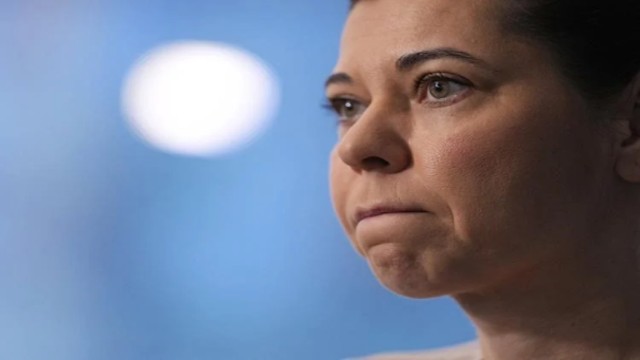
Pediatric researcher Dr. Dani Dumitriu speaks to reporters in her office about the impact of federal funding cuts on medical research at Columbia University (The Canadian Press Newssource)
Columbia University is facing intense scrutiny after agreeing to strict policy changes to regain $400 million in federal funding revoked by the Trump administration. The funding cuts have significantly impacted medical and scientific research, leaving many researchers and students uncertain about the future of their projects.
Major Blow to Scientific Research
The funding cuts have disrupted critical research at Columbia University’s medical center and laboratories, affecting studies on cancer treatments, COVID-19’s impact on children, and rural water quality. Experts warn that the decision could have lasting consequences on medical advancements.
Dr. Dani Dumitriu, a pediatric researcher, expressed frustration, stating that funding for her study on babies born during the pandemic has been halted. Similarly, Dr. Andrew Lassman, a brain cancer specialist, fears that ongoing research may face limitations, forcing difficult decisions about treatment priorities.
“This is real, not theoretical research,” Lassman emphasized, pointing out that life-saving studies should not be affected by political decisions.
Columbia’s Policy Shift Sparks Controversy
To regain its funding, Columbia University announced significant policy changes, including:
- Stricter student disciplinary rules
- A ban on protesters wearing masks
- Restrictions on demonstrations in academic buildings
- A revised definition of antisemitism
- Increased oversight on the Middle Eastern studies program
These changes have sparked outrage among faculty and free speech advocates. The American Association of University Professors and the American Federation of Teachers have filed a lawsuit, arguing that the federal government’s actions violate free speech laws.
Government’s Response
U.S. Education Secretary Linda McMahon acknowledged Columbia’s efforts, stating the university is “on the right track.” However, it remains unclear if or when the funding will be reinstated. Columbia’s interim president, Katrina Armstrong, defended the policy changes, emphasizing that they were necessary for the university’s long-term stability.
Impact Beyond the University
The funding cuts have also affected programs beyond medical research. Columbia’s Teachers College lost a key grant that trained graduate students to become teachers for the deaf and hard of hearing. Co-director Elaine Smolen stressed the urgency of the program, warning that delays in specialized education could worsen outcomes for children in need.
Environmental scientist Benjamin Bostick also expressed frustration, as his research on rural water quality in Arizona, Oklahoma, and the Dakotas has been stalled. “The government is telling me they don’t care about these communities,” he said.
Uncertain Future for Researchers
For now, researchers like Dumitriu are searching for alternative funding sources. While her team can continue some work, the loss of the National Institutes of Health grant has put significant pressure on ongoing projects.
“We are living moment to moment,” Dumitriu said, adding that science should never be caught in political crossfire.
As Columbia University navigates this crisis, the debate over academic freedom, government influence, and research funding continues to intensify.















